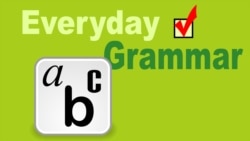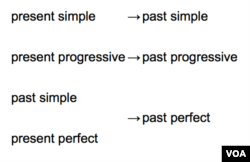For VOA Learning English, this is Everyday Grammar.
In English, wish is a powerful word for expressing your dreams, hopes and desires. Here are some examples:
We wish you the best.
Her mother wishes they would get married.
I wish I had brought my camera.
I wish to speak to the president.
You will often hear wish in music, movie dialog, poetry and inspirational speeches. Let’s take a look at some of the tricky grammar issues with wish.
A wish is a desire for a different reality. In general, wishes express desires that are unlikely to happen. If you say, “I wish I could fly,” it means you probably will not grow wings and learn to fly.
A Unique Verb
Wish follows a unique -- and rather confusing -- set of grammar rules. Wish uses the same verb back shifting rule as reported speech.
A wish about the present uses a simple past main verb.
He wishes he understood the lesson.
In this example, understood is a simple past verb.
Wish is often followed by that. That introduces a noun clause. It is optional. For example:
I wish that I looked like a movie star.
I wish I looked like a movie star.
Both of these sentences have the same meaning.
In hypothetical situations, such as wishes and conditionals, use were for all pronouns.
I wish you were here.
I wish she were here.
I wish I were there.
In everyday conversation, you might hear was after wish. For example, “I wish I was the president.” Was is acceptable in informal situations, but you should use were in formal situations. This confusing rule comes to English through Latin.
Future wishes
Wish followed by would usually implies a request. For example:
I wish you would finish college before you get married.
Wish can be used after be going to or will to predict a future regret. Maybe you have heard your parents say something like this:
Someday, you are going to wish you had taken my advice.
When you are older, you will wish that you had studied engineering.
Past wishes
Let’s take a closer look at past wishes. Generally, a past wish is a wish that did not come true. To refer to a past wish, use a past perfect verb after the object. To form the past perfect, use had followed by a past participle verb.
She wishes she had written down the phone number.
I wish I had known that you were in town last week.
Listen to country singer Gene Autry make a past wish in an old song called “I Wish I Had Never Met Sunshine.” In this song, Sunshine is the name of a lost lover.
I wish I had never met Sunshine,
and Sunshine had never met me
For 21 years I'll regret it
'Cause I'm in the jailhouse, you see
Most of the time, a wish about the past suggests regret. The speaker would have acted differently if he or she could turn back time. A past wish has a similar grammatical function to a past unreal conditional.
Listen to this song by Taylor Swift. You will hear three different uses of wish. She starts with a future wish, then shifts to the past, then to the present.
I wish you would come back (future)
(I) wish I (had) never hung up the phone like I did (past)
I wish you knew that I'll never forget you as long as I live. (present)
I wish you were right here, right now it’s all good (present)
Wish + infinitive
Wish followed by an infinitive makes a strong demand. For example:
I wish to speak to the manager.
I wish to learn the truth about what happened.
Wish can be followed by an infinitive, but never by a gerund. For example, it would sound strange to say, “I wish going skiing.” The correct form is, “I wish to go skiing.”
Hope vs. Wish
What’s the difference between hope and wish? In some contexts they can be interchangeable. Hope usually expresses desire that is possible. Wish, on the other hand, refers to an outcome that is not likely to happen.
Pay attention to the different contexts of hope and wish in these examples.
I hope you pass the test. (possible)
I wish I could fly. (impossible)
I hope I get to work on time. (possible)
I wish I were a millionaire. (not likely)
If wish is “reaching for the stars,” then hope is “reaching for the sky.”
And that’s Everyday Grammar. We hope you will write to us in the Comments and on our Facebook page.
I’m John Russell.
And I’m Ashley Thompson.
[Pink Floyd]
How I wish, how I wish you were here
We’re just two lost souls…
Adam Brock wrote this story for VOA Learning English. Dr. Jill Robbins and Kathleen Struck were the editors.
Words in This Story
verb back shifting rule – grammatical term. The concept of going back one verb tense.
|
present simple |
→ |
past simple |
|
present progressive |
→ |
past progressive |
|
past simple |
→ |
past perfect |
|
present perfect |
inspirational – adj. causing people to want to do or create something
hypothetical – adj. not real : imagined as an example
imply – v. to express (something) in an indirect way : to suggest (something) without saying or showing it plainly
regret – n. to feel sad or sorry about (something that you did or did not do) : to have regrets about (something)
jailhouse – n. a place where people are kept when they have been arrested and are being punished for a crime
context – n. the words that are used with a certain word or phrase and that help to explain its meaning
interchangeably – adv. capable of being used in place of each other







